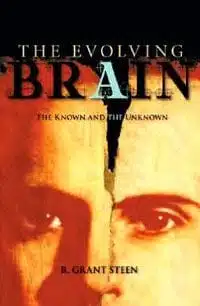
In some ways, it seems rather paradoxical that there should be an easy-to-read book about what is essentially the most complex object in the universe — the human brain — but this is a pretty fair description of R. Grant Steen’s The Evolving Brain. In writing his book, Steen, who is both a psychiatrist and a neurophysiologist, has in mind the general reader rather than the professional, and takes care to describe even the most complex phenomena in straightforward, user-friendly language that even the most right-brained reader shouldn’t have much trouble with.
This leads to the use of a lot of analogies, some of them rather over-used (how often, I wonder, have the brain’s functions been compared to computer systems), others more helpful (his brain-as-anthill analogy is useful, if simplistic — but in this field, what isn’t?). No lab-bound egghead, Steen is refreshingly up-to-date on all the latest debates and controversies in brain studies (and there are lots of them), and as well as describing the brain’s physiological and neurochemical functions, he tries to show how they relate to such nebulous phenomena as thoughts, emotions and consciousness. Not an easy task, by any stretch of the imagination, but Steen manages it deftly. In clear, non-technical prose, he discusses the current state of research on the nature of learning, genetic influences on the brain, and the connections between mental functions and personality attributes like creativity and temperament.
Steen spends a good deal of time discussing brain issues that have been in the news recently — things like stem cell research, intelligent design, brain death, with particular reference to the Terri Schiavo case. Did you know serious brain injuries were more likely to lead to a permanent vegetative state in women than in men? It’s true, and scientists still haven’t figured out why (it’s not as though women have smaller or more fragile brains, after all). This brings up another engaging feature of Steen’s writing. Unlike many other authors in the “popular science” genre, he is perfectly willing to discuss competing theories and debates, as well as drawing attention to things that remain mysterious, and perhaps always will. As the book’s title suggests, neurophysiology is an evolving field, and although new discoveries are being made every day, most of the territory remains yet to be charted.
The only thing that interfered with my enjoyment of this book was its dryness. Obviously, a subject like this is hardly going to be a laugh a minute, but Steen’s prose can become a little humorless after 400 pages. Speaking as a Freudian, I’d also have been interested to see more than one single (dismissive) reference to at Freud, such as, for example, a discussion of the pioneering work of neuroscientists like Mark Solms, whose work combines Freudian psychoanalysis with the latest advances in neuropsychology. Other than those minor quibbles, this is a rare treat: a brainy book about the brain.
